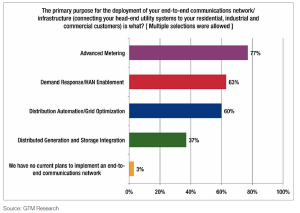Commentary
-
Commentary
Power Industry Flip-Flops on Support of Carbon Controls
I recently had the privilege of moderating the Power Industry Executive Roundtable, part of the annual ELECTRIC POWER Conference & Exhibition opening ceremonies. Usually, the power industry executives have predictable views of important issues, but not this year.
-
Commentary
The Second Wave of the Smart Grid
Now that U.S. utilities have taken federal stimulus funds and seamlessly built out two-way advanced metering infrastructure (AMI) connecting utility control centers and end users (ok, not completely, but let’s assume that the “stall-ulus” becomes a true stimulus), the question becomes, what’s next? At the moment, this new “comm layer” or “platform” has utilities planning in two directions: upstream and downstream from the smart meters.
-
Commentary
Wind’s Cost Is Underestimated; Its Value Overestimated
Wind power’s cost is hidden in subsidies; its value is overstated and based on false metrics that don’t account for reliability and dispatchability.
-
Commentary
Beyond the Backyard: Today’s NIMBY
Some amount of NIMBYism should be expected when developing any new project. Good planning and actively engaging community leaders early and often will increase your success quotient.
-
Commentary
Minds for the Future: No. 1, The Disciplined Mind
The regulatory process functions well when citizens and regulators are fully engaged and knowledgeable about important issues. The regulator must also grapple with the ever-changing roles of consumers and utilities to optimize the value of the commodity to society.
-
Commentary
How Green Is Green Power?
The demand for "green" electricity — electricity produced from renewable sources like wind, solar, hydropower, geothermal, and biofuels — is at an all-time high in the U.S. Over the past decade, solar and wind capacity have increased dramatically due largely to mandatory renewable portfolio standards (RPS), which have now been adopted by 27 states.
-
Commentary
In Praise of Electric Power
The fear of losing electric power inspires thoughts about how vital electricity is to our lives. It is fundamental to modern living, and that’s entirely a good thing.
-
Commentary
Climate Change: Developing Countries Control the Thermostat
In December 2009, representatives of nearly 200 governments met in Copenhagen, Denmark, to hammer out the details of a new climate change treaty. Treaty drafts indicated that industrialized countries would be required to reduce their greenhouse gas emissions—primarily carbon dioxide (CO2)—up to 80% by 2050. Developing countries would not be required to reduce emissions much, […]
-
Commentary
I’ve Got a Secret
Why did the Environmental Protection Agency (EPA) drop the Cone of Silence around the good news about the continuing trend of improved air quality? The agency’s annual report of air quality trends was released in mid-March with barely a whisper. Even the major media outlets failed to report on the excellent results.
-
Commentary
Rethinking the Power Industry’s Dash to Gas
During a recent meeting of state utility commissioners, the CEO of a Fortune 500 electric power company said natural gas prices promise reliability but "always break your heart." What breaks my heart is the electric power industry’s ongoing love affair with natural gas. Using natural gas for generating electricity is not the best or highest use for this clean, green, and domestically abundant resource.

